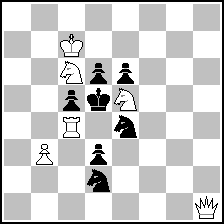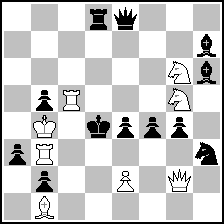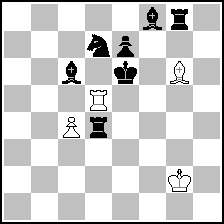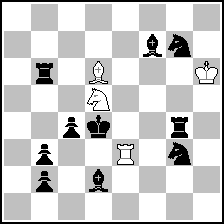|
| Page: [Previous] [Next] 1 2 3 |
| (21) Posted by Hauke Reddmann [Monday, Jul 9, 2007 12:08] |
My 100$: There are weasels...and wolverines.
For two instructive cases, cf my judge report of the
SCHWALBE 1998 #2 informal.
 (= 6+7 ) (= 6+7 )
(HR, de-weaseling SCHWALBE 10170 by H. Ahues, 3th prize)
I don't have the original at hand, but be assured I captured
100% of the matrix and constructed away a rook that *for the
line theme* only served as idle field protector. Of course,
the version is worthless as I also constructed away the line
theme. (You can imagine that a composer of Ahues' quality
used that rook in another variant!)
 (= 8+12 ) (= 8+12 )
(HR, de-weaseling SCHWALBE 9940 by A. Onkoud, 2nd no-prize)
It really hurt me that I had to kick Onkouds problem into the
bin (Abdelaziz, please forgive me and post your version for
comparison) - in this version he would have earned a prize,
but in his one of the thematic tries Sxe4/Sxf4 had a fake
line-opening (f3 also hung the knight, making the line opening
for the bishop irrelevant and weaseling it).
Hauke
|
|
| (22) Posted by Harry Fougiaxis [Sunday, Jul 15, 2007 16:15] |
I showed pins so far, how about some unpins now? I found this simple, yet very enlightening example in one of Chris Feather's "Helpmates in Microscope" articles in Die Schwalbe. How should have the composer presented this problem? (btw, CJF does not challenge the readers, probably because it is easy to think about it after reading his excellent analysis).
J. Lehnert
1 Comm Tungsram Cup Ty 1978
 (= 4+7 ) (= 4+7 )
h#2 2.1.1.1
1.Re4 Rc5 2.Re5+ Rxc6#
1.Bg7 Bh7 2.Bf6+ Bxg8#
|
|
| (23) Posted by Uri Avner [Sunday, Jul 15, 2007 20:42]; edited by Uri Avner [07-07-15] |
Of course the answer is something like:
 (= 4+7 ) (= 4+7 )
h#2 2111
|
|
| (24) Posted by Paz Einat [Sunday, Jul 15, 2007 21:53] |
-c6 & -g8
|
|
| (25) Posted by Harry Fougiaxis [Tuesday, Jul 17, 2007 00:19]; edited by Harry Fougiaxis [07-07-17] |
Yes, this was an easy one. Either you arrange the bishop and the rook standing already on the lines as Uri did, or you provide an alternative path to them (for instance, bR on h4 and bB on c1). I guess that Uri's approach is preferable. The composer apparently wanted to add an insignificant, at least to me, visual enhancement of "sort of parallel" black and white manoeuvres, however in doing so he overlooked that the thematic black pieces have a single way to reach the squares they need to block, which makes the unpins totally superficial, as Paz pointed out.
|
|
| (26) Posted by Uri Avner [Tuesday, Jul 17, 2007 01:39]; edited by Uri Avner [07-07-17] |
Talking about microscopic nuances, perhaps the best position is:
 (= 4+7 ) (= 4+7 )
h#2 2111
inserting 1.Rf3 and 1.Bg3 as erroneous possibilities, on top of the direct unpinning by Bc6 and Rg8.
|
|
| (27) Posted by Jacques Rotenberg [Tuesday, Jul 17, 2007 07:04]; edited by Jacques Rotenberg [07-07-18] |
you can also have, instead of WPc4 and BSd7 a single WSb6. (and then push all 1 square left against cooks)
In fact to put the WS on f6 instead of b6 (and add various things against cooks) gives models and is nicer.
You can also manage to obtain nice hotf with two echo new mates :
White : Kf1 Rc4 Bf5 Se5 Pb6g4
Black : Kd5 Rf7d2 Bb5g3 Pd6
 (= 6+6 ) (= 6+6 )
Possible also to build this without White Pawns (a little bit heavier)
1.Rd3 Rb4 2.Rd4+ R×b5‡
1.Ba4 R×a4 2.Rd4 Ra5‡
1.Bf4 Bg6 2.B×e5+ B×f7‡
1.Rh7 B×h7 2.B×e5 Bg8‡
____________________________________________
(diagram added by Administrator)
|
|
| (28) Posted by Uri Avner [Tuesday, Jul 17, 2007 12:27] |
I especially like the idea of Se5.
|
|
| (29) Posted by Abdelaziz Onkoud [Tuesday, Jul 17, 2007 23:26] |
Bonsoir ,
Sans pions blancs
Blancs : Rf1 Tç4 Ff5 Cé5
Noirs : Rd5 Db5 Tf7b3 Fç1 Pd6
h‡2 (4+6)
1.Ff4 Fg6 2.F×é5+ F×f7‡
1.Td3 Tb4 2.Td4+ T×b5‡
|
|
| (30) Posted by Abdelaziz Onkoud [Tuesday, Jul 17, 2007 23:37] |
Bonsoir ,
les 4 solutions de Jacques sont grandioses. Rien à voir avec les 10 pièces que j'ai proposé. Une autre piste est le problème suivant.
Blancs : Ré2 Fé5 Cb5a3
Noirs : Rç5 Da6 Té7b3 Fb1 Pç7b6ç6
1.Fé4 Ff6 2.Fd5+ F×é7‡
1.Td3 C×ç7 2.Td5+ C×a6‡
|
|
| (31) Posted by Jacques Rotenberg [Wednesday, Jul 18, 2007 02:54]; edited by Jacques Rotenberg [07-07-18] |
example of building without white pawns :
 (= 4+10 ) (= 4+10 )
H#2 4 sols
1.Rf4 Re2 2.Re4+ R×d2‡
1.Be6 Bc7 2.B×d5+ B×b6‡
1.Be1 R×e1 2.Re4 Rd1‡
1.Rb8 B×b8 2.B×d5 Ba7‡
|
|
| (32) Posted by Harry Fougiaxis [Wednesday, Jul 18, 2007 09:04] |
@ Abdelaziz : in your first version, I would move the Rb3 to h3, replace the bQ with a bishop and add a black pawn on a7, so that the rook has two alternatives towards d4 to choose from. In the second version, the unpins are fake, the bRe7 could be replaced with a pawn, for instance. Please read my post (25) above again.
|
|
| (33) Posted by Jacques Rotenberg [Wednesday, Jul 18, 2007 09:57]; edited by Jacques Rotenberg [07-07-18] |
Also possible to go further with black weasels
 (= 4+13 ) (= 4+13 )
with now the tries 1.Sc6 ? and 1.f4 ? that intercept each a good and a bad black line.
The price paid is a bit high.
Or, also
 (= 6+8 ) (= 6+8 )
|
|
| (34) Posted by Uri Avner [Wednesday, Jul 18, 2007 16:15]; edited by Uri Avner [07-07-18] |
The 2nd one has a dualized error committed by 1.Sd3.
|
|
| (35) Posted by Jacques Rotenberg [Wednesday, Jul 18, 2007 17:47]; edited by Jacques Rotenberg [07-07-18] |
You are right Uri, so forget it.
I think it is good enough for publication, I propose
"Harry + Uri + myself - after J. Lehnert"
What version to choose ?
12 or 14 or 17 ?
|
|
| (36) Posted by Frank Richter [Thursday, Jul 19, 2007 08:51]; edited by Frank Richter [07-07-19] |
The positions are already considered to be published.
|
|
| (37) Posted by Jacques Rotenberg [Thursday, Jul 19, 2007 09:46]; edited by Jacques Rotenberg [07-07-19] |
what do you mean ? Here, we are not on a publication place. Just a chat.
I feel free to send this anywhere for publication.
|
|
| (38) Posted by Frank Richter [Thursday, Jul 19, 2007 09:52] |
You wrote: "it is good enough for publication".
I understand the phrase that you like to send the problem to publish it in a journal etc. Am I wrong?
|
|
| (39) Posted by Jacques Rotenberg [Thursday, Jul 19, 2007 09:58] |
You are right
|
|
| (40) Posted by Harry Fougiaxis [Thursday, Jul 19, 2007 17:48] |
Frank obviously refers to Article 20, paragraph 2c of the Codex.
|
|
Read more... |
Page: [Previous] [Next] 1 2 3
MatPlus.Net  Forum Forum  Helpmates Helpmates  Analysing helpmates in 2 Analysing helpmates in 2 |
 ISC 2024
ISC 2024 Forum
Forum  Helpmates
Helpmates  Analysing helpmates in 2
Analysing helpmates in 2 


